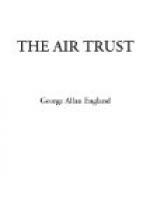Again he shouted, holding to a tree-trunk at the very edge of a cliff of limestone, and peering far down into the abyss where the car had taken its final plunge. Still no answer. But, from below, the heavy smoke still rose. And now, peering more keenly, Armstrong caught sight of the wreck itself.
“There it is, and burning like the pit of Hell!” he exclaimed. “And—what’s that, under it? A man?”
He could not distinctly make out, so thick the foliage was. But it seemed to him that, from under the jumbled wreckage of the blazing machine, something protruded, something that suggested a human form, horribly mangled.
“Here’s where I go down this cliff, whatever happens!” decided Gabriel. And, acting on the instant, he began swinging himself down from tree to bush, from shrub to tuft of grass, clinging wherever handhold or foothold offered, digging his stout boots into every cleft and cranny of the precipice.
The height could not have been less than a hundred and fifty feet. By dint of wonderful strength and agility, and at the momentary risk of falling, himself, to almost certain death, Gabriel descended in less than ten minutes. The last quarter of the distance he practically fell, sliding at a tremendous rate, with boulders and loose earth cascading all about him in a shower.
He landed close by the flaming ruin.
“Lucky this isn’t in the autumn, in the dry season!” thought he, as he approached. “If it were, this whole cliff-side, and the woods beyond, would be a roaring furnace. Some forest-fire, all right, if the woods weren’t wet and full of sap!”
Parting the brush, he made his way as close to the car as the intense heat would let him. The gasoline-tank, he understood, had burst with the shock, and, taking fire, had wrapped the car in an Inferno of unquenchable flame. Now, the woodwork was entirely gone; and of the wheels, as the long machine lay there on its back, only a few blazing spokes were left. The steel chassis and the engine were red-hot, twisted and broken as though a giant hammer had smitten them on some Vulcanic anvil.
“There’s a few thousand dollars gone to the devil!” thought he. But his mind did not dwell on this phase of the disaster. Still he was hoping, against hope, that human life had not been dashed and roasted out, in the wreck. And again he shouted, as he worked his way to the other side of the machine—to the side which, seen from the cliff above, had seemed to show him that inert and mangled body.
All at once he stopped short, shielding his face with his hands, against the blaze.
“Good God!” he exclaimed; and involuntarily took off his cap, there in the presence of death.
That the man was dead, admitted of no question. Pinned under the heavy, glowing mass of metal, his body must already have been roasted to a char. The head could not be seen; but part of one shoulder and one arm protruded, with the coat burned off and the flesh horribly crackled; while, nearer Gabriel, a leg showed, with a regulation chauffeur’s legging, also burned to a crisp.




